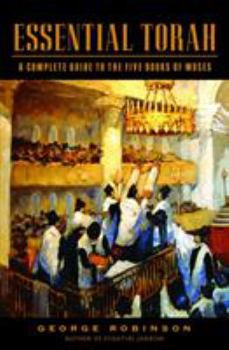Essential Torah: A Complete Guide to the Five Books of Moses
Select Format
Select Condition 
Book Overview
Whether you are thinking about studying the Bible for the first time or you're simply curious about its history and contents, you will find everything you need in Essential Torah. George Robinson,... This description may be from another edition of this product.
Format:Hardcover
Language:English
ISBN:0805241868
ISBN13:9780805241860
Release Date:October 2006
Publisher:Schocken Books Inc
Length:624 Pages
Weight:2.17 lbs.
Dimensions:1.4" x 6.5" x 9.3"
Customer Reviews
2 ratings
Moses written Law
Published by Thriftbooks.com User , 14 years ago
I found this book to be a comprehensive introduction to a Jewish understanding for the foundation of the three geat mono-theistic traditions. 'Essential Torah' is a well written easy to read guide for those of us born outside a Jewish culture. I read this book from the local library and decided to purchase it as a reference for reading Torah, the Prophets and Writings (Old Testament). The second half of 'Essential Torah' contains the weekly daily readings to enable one to read through Torah in one year with some minor commentary. I look forward to using this guide in my own study and pray the Almighty helps me to understand more of Him through this.
A Profound Entrance to the Soul of Jewish life
Published by Thriftbooks.com User , 16 years ago
Doubtless, there are countless books about the Torah: from scholarly diatribes, with a flood of footnotes on every page, to introductory texts that end up as Bar Mitzvah gifts for beginners. Robinson's wonderful _Essential Torah_ is unlike either of these extremes, which is what makes it such an utterly fascinating read. Robinson eschews the normal historical survey one might expect of a work on this subject. Rather than emulating a seminary study on the Hebrew Bible ("in approximately 5000 BC . . ."), Robinson begins with a deeply personal, yet far reaching, question: What is the Torah, and why is it the centre of Jewish belief? Answering this question leads to a beautiful sequence of observations, vignettes, and breathtakingly fresh information. Chapter One, rather than being a litany of names and dates, describes a day in the life of a Torah scribe . . . Robinson, from the start, instills an atmosphere of awe and reverence for the audience that no footnote could manage. By first showing the *life* of the Torah, Robinson can more effectively trace back the raw data of histiographic methodology. I am not suggesting this book is lacking in useful historical information. On the contrary, it provides ample documentation on the social and cultural reception of Torah as speech and text. Although writing from a clearly pronounced Reform theology, Robinson does an excellent job at providing the viewpoints of all, from the most liberal to the most conservative. Uber-specialists will probably not be satisfied with either the digressive, friendly tone of this work, but then again they are not Robinson's intended audience. By writing an a thoroughly informative work, that remains readable and accessible to a wide audience, Robinson has done much to bring a love of Torah to a much broader community. I truly feel that, even the most cynical and secular of lapsed Jewry, will find much to cherish and adore in the beauties of Torah through Robinson's writing. As a very mild suggestive criticism, Robison's introduction seems to suggest that this book is intended to provide non-Jews with a basic entrance to understanding the Torah. While I would certainly not hesitate to suggest this book to interested friends, of any religious persuasion, the book is clearly intended for a Jewish audience: although Robinson provides translations of more arcane Hebrew terms, there are many assumptions made throughout as to prior understanding. For example, how many Buddhists do you know can explain the differences between a Sephardic and Ashkenazic liturgy? For that matter, give the decreasing level of observance for many American Jewish communities, how many non-practising Jews do you know who can identify what a 'bimah' is? Robinson assumes familiarity with these terms and notions. This is reasonable enough, I suppose, but might intimidate a reader who knows nothing of Torah, and genuinely wants to learn. As I said, this is a mild criticism. Overall, the






